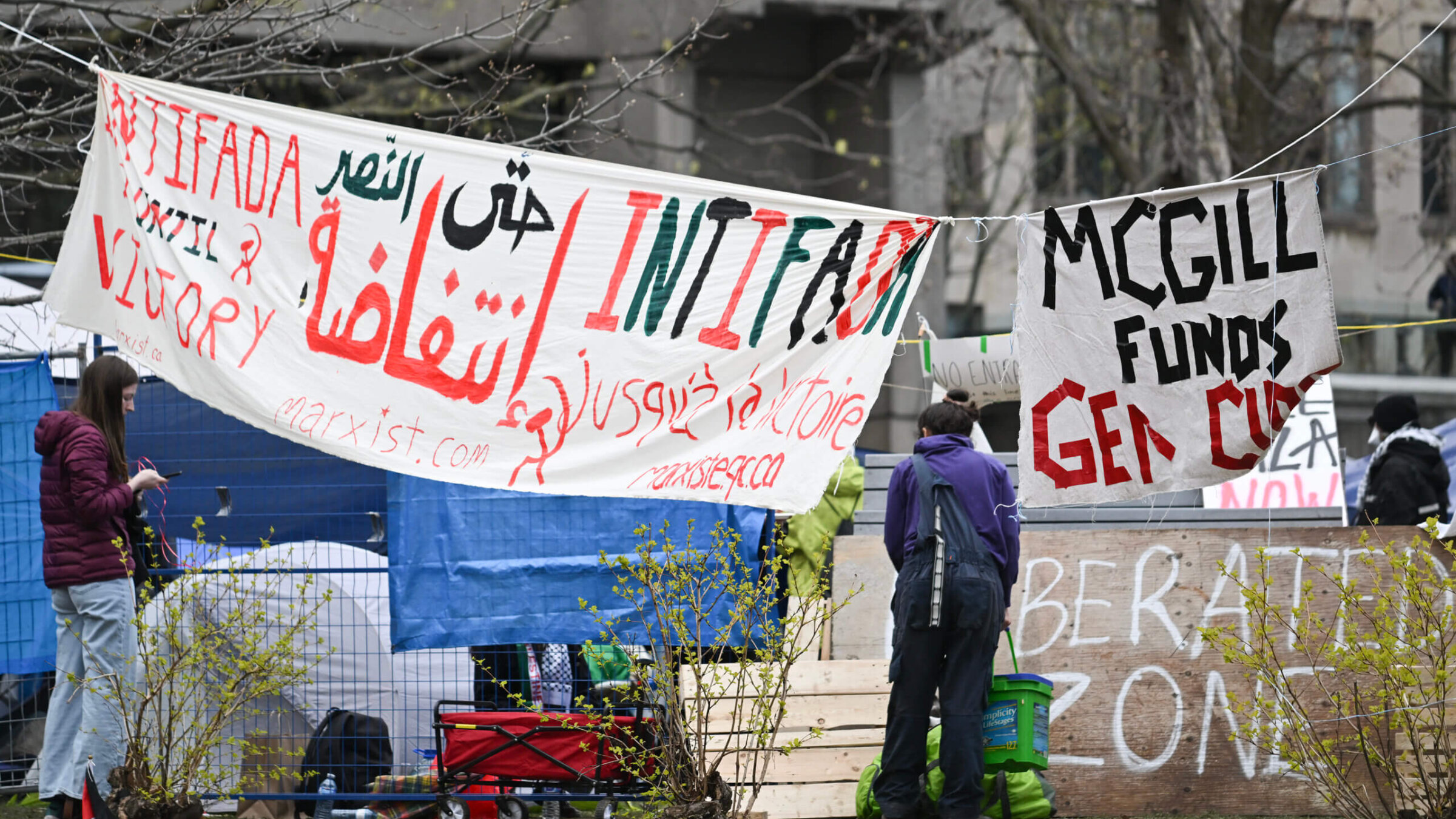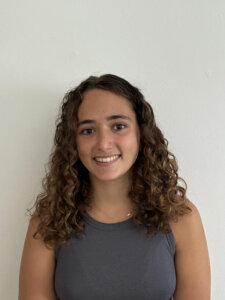For Jewish students at McGill like me, our return to campus is filled with dread
The Canadian university is home to regular pro-Palestinian protests, often with virulent antisemitic rhetoric

Pro-Palestinian students and activists protest at an encampment on the campus at McGill University in Montreal April 29. Photo by Graham Hughes/AFP via Getty Images
“What did you do this summer?” the student sitting next to me in my Canadian foreign policy class at McGill University asked.
I panicked, then deflected. “A day camp counselor in Toronto,” I said.
I couldn’t mention my Birthright trip, internship in Israel, or being a counselor at my Jewish Zionist overnight summer camp in Nova Scotia. I couldn’t mention my summer plans, because McGill was home to some of the most virulent pro-Palestinian protests and the first encampment in Canada. When I got dressed for my first day of classes this week, returning to McGill as a sophomore, I decided against wearing a Magen David necklace.
To the casual onlooker, McGill’s campus in Montreal is charming — a peaceful retreat from a bustling city. Nestled at the foot of Mount Royal, the storied university dubbed “the Harvard of Canada” lies behind hallowed gates, its green shining with freshly laid grass.
To a Jewish student, like me, however, walking through the gates of McGill requires cautious navigation as I dodge anti-Israel pamphleteers. The new field of grass, blocked off by red tape, is a reminder of the damage caused to McGill by the monthslong encampment.
For pro-Israel Jewish students at McGill (even ones that do not support the current Israeli government, like me), the typical return to campus excitement is hindered by the fear of past, present and future antisemitism.
Oct. 7 at McGill
The encampment took over the lower half of campus last April, just days after I went home. The encampment protesters vandalized McGill buildings, broke windows on the property and allegedly assaulted a security officer. Though the encampment was thankfully dismantled on July 10, protests continued. Each Sunday, thousands gather and walk through downtown Montreal.
From my new apartment next to campus, I will be able to hear chants berating Israel from my bedroom. Looking out my window I’ll be able to see posters that too often border on antisemitism: “Globalize the intifada” and “No civilians in Israel.”
I’m dreading the first student-organized campus protest this Friday. (“Take back your campus” proclaims its advertisement circulating on social media.) It’s unavoidable: Protesters block pathways on campus and their voices can be heard from even the top floor of the library.
I understand the right to protest peacefully. But when I consider if the pro-Palestinian protesters on campus are voicing a political opinion or hateful rhetoric, the latter is too often the answer.
Their words from last November are engraved in my brain: “Zionism is the motivation of everything, even your thoughts. Whoever has the most money makes the rules. Zionism is the 51% dictating their will to the 49%.”
I saw signs with illustrations of Jewish McGill professors who are associated with Israeli academic institutions and programs covered in fake blood, automatically at fault for any and all ties to Israel.
On my first day of school last year, I walked through campus with new friends (most of whom were not Jewish) that I had made from frosh, a week of social activities for first years before school begins. I was excited to have met new people from all around the world with whom I explored the McGill dining halls and libraries, their friendship easing the overwhelming start to university.
Just two months later, I first encountered antisemitism from those same people. My new friends reacted negatively to events run by Hillel. Another labeled Oct. 7 as an act of liberation. They reposted Instagram posts that claimed the tragedy of Oct. 7 was exaggerated.
Though I was open to conversation about the conflict, I was not willing to accept antisemitism or denial of the Hamas attack. By the end of October, I had lost a number of the friendships I had formed just weeks before. The excitement and safety I had been so lucky to find had vanished.
A changed campus
This year, security surrounds campus. A few guards stand around the gates, where there are a handful of protesters at any hour. More are scattered on the pathways through the campus, and each building has security nearby. Though security is there to protect me and make me feel safe, their presence is dispiriting. Why must security guards be on watch in a community of people mostly my age, all there for education and the supposed free flow of ideas?
McGill’s administration addressed this issue in their start-of-term message. “Normally,” wrote the provost and executive vice president alongside the interim deputy provost, “a message of this kind would close by wishing you a happy, healthy, and successful academic term.” The administration expressed hope for a peaceful campus, but demanded that the educational environment not be “misappropriated … as a platform to persuade others of their political position.”
I feel dread anticipating campus life this year. Next week is the club fair. Will there be a sign, like last year, hanging over the stairwell, alleging that McGill invests in “genocide”?
Student government elections will occur soon. Will Jewish candidates be targeted for association with Israel, like they were last year, effectively disqualifying them for office?
I hope to join my school newspaper this year, but I worry that my internship in Tel Aviv this past summer will affect my selection. Do I dare to counter the narrow anti-Israel bias that is pushed forward in their newsroom, or, more importantly, will I even be allowed into that newsroom in the first place?
I’m already afraid for the anniversary of Oct. 7, and am seeing posters advertising the one-year anniversary of the terror attacks as as “International Day of Action,” calling for “the Zionist entity [to] fall.”
For those of us who don’t support the current Israel government, yearn for a two-state solution and pray for peace, those days of action are menacing. Where do we belong?
I understand the pain felt by the many groups involved, including myself, but I am also angry. I should feel confident wearing my Magen David. I should be able to walk through campus without seeing graffiti targeting Jews. I should be able to fearlessly share my identity and my religion with my classmates.
Maybe returning to campus next year won’t require me to swallow my fears, and the only stress regarding university will be the course work. Maybe the security guards will be gone, the campus will return to a place of open learning, and I can tell my classmates about my Jewish summer camp. Hopefully conversation will replace broad accusations and black-and-white thinking. And if hope isn’t a strategy, it should be a good start.
A message from our Publisher & CEO Rachel Fishman Feddersen

I hope you appreciated this article. Before you go, I’d like to ask you to please support the Forward’s award-winning, nonprofit journalism so that we can be prepared for whatever news 2025 brings.
At a time when other newsrooms are closing or cutting back, the Forward has removed its paywall and invested additional resources to report on the ground from Israel and around the U.S. on the impact of the war, rising antisemitism and polarized discourse.
Readers like you make it all possible. Support our work by becoming a Forward Member and connect with our journalism and your community.
— Rachel Fishman Feddersen, Publisher and CEO






















